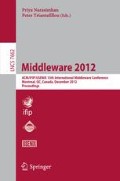Abstract
Solid state disks (SSDs) have the potential to revolutionize the storage system landscape, mostly due to their good random access performance, compared to hard disks. However, garbage collection (GC) in SSD introduces significant latencies and large performance variations, which renders widespread adoption of SSDs difficult. To address this issue, we present a novel garbage collection strategy, consisting of two components, called Advanced Garbage Collection (AGC) and Delayed Garbage Collection (DGC), that operate collectively to migrate GC operations from busy periods to idle periods. More specifically, AGC is employed to defer GC operations to idle periods in advance, based on the type of the idle periods and on-demand GC needs, whereas DGC complements AGC by handling the collections that could not be handled by AGC. Our comprehensive experimental analysis reveals that the proposed strategies provide stable SSD performance by significantly reducing GC overheads. Compared to the state-of-the-art GC strategies, P-FTL, L-FTL and H-FTL, our AGC+DGC scheme reduces GC overheads, on average, by about 66.7%, 96.7% and 98.2%, respectively.
Access this chapter
Tax calculation will be finalised at checkout
Purchases are for personal use only
Preview
Unable to display preview. Download preview PDF.
References
Caulfield, A.M., et al.: Understanding the impact of emerging non-volatile memories on high-performance, IO-intensive computing. In: SC (2010)
Kgil, T., Roberts, D., Mudge, T.: Improving NAND flash based disk caches. In: ISCA (2008)
Caulfield, A.M., Grupp, L.M., Swanson, S.: Gordon: Using flash memory to build fast, power-efficient clusters for data-intensive applications. In: ASPLOS (2009)
Lee, S.W., et al.: A case for flash memory SSD in enterprise database applications. In: FAST (2011)
EMC: Raw drive capacity cost trends, http://wikibon.org/w/images/a/a4/emcrawdrivecapacitycosttrends.jpg
Micheloni, R., et al.: Inside NAND Flash Memories. Springer (2010)
Caulfield, A.M., et al.: Characterizing flash memory: Anomalies, observations,and applications. In: SC (2009)
Kang, J.U., et al.: A superblock-based flash translation layer for NAND flash memory. In: EMSOFT (2006)
Lee, S.W., et al.: FAST: An efficient flash translation layer for flash memory. In: EUC Workshops (2006)
Chang, L.P., Kuo, T.W.: Real-time garbage collection for flash-memory storage systems of real-time embedded systems. TECS (2004)
Choudhuri, S., Givargis, T.: Deterministic service guarantees for NAND flash using partial block cleaning. In: CODESS+ISSS (2008)
Kim, J., et al.: A space-efficient flash translation layer for Compact Flash systems. In: TCE (2002)
Jung, M., Yoo, J.: Scheduling garbage collection opportunistically to reduce worst-case I/O performance in SSDs. In: IWSSPS (2009)
ULINK technology, http://www.ulinktech.com/
Intel, http://www.iometer.org/
Intel, Seagate: Serial ATA Native Command Queuing: An Exciting New Performance Feature for Serial ATA. Intel and Seagate (July 2003)
LeCroy, http://www.lecroy.com/
T10: Technical Committee T10 (2009), http://www.t10.org/
Colarelli, D., Grunwald, D.: Massive arrays of idle disks for storage archives. In: SC (2002)
Mi, N., et al.: Efficient management of idleness in storage systems. The ACM Transactions on Storage Journal (2009)
Golding, R., et al.: Idleness is not sloth. In: USENIX ATC (1995)
Narayanan, D., et al.: Migrating server storage to SSDs: Analysis of tradeoffs. In: EuroSys (2009)
SNIA: IOTTA Repository (2006), http://iotta.snia.org/
Kim, J.H., et al.: Incremental Merge Methods and Memory Systems Using the Same. U.S. Patent #2006004971A1 (January 5, 2006)
Narayanan, D., et al.: Everest: Scaling down peak loads through I/O off-loading. In: EuroSys (2008)
Samsung Electorincs: K9GAG0B0M. In: Data Sheet (2008)
Hu, X.Y.: et al.: Write amplification analysis in flash-based solid state drives. In: SYSTOR (2009)
Author information
Authors and Affiliations
Editor information
Editors and Affiliations
Rights and permissions
Copyright information
© 2012 IFIP International Federation for Information Processing
About this paper
Cite this paper
Jung, M., Prabhakar, R., Kandemir, M.T. (2012). Taking Garbage Collection Overheads Off the Critical Path in SSDs. In: Narasimhan, P., Triantafillou, P. (eds) Middleware 2012. Middleware 2012. Lecture Notes in Computer Science, vol 7662. Springer, Berlin, Heidelberg. https://doi.org/10.1007/978-3-642-35170-9_9
Download citation
DOI: https://doi.org/10.1007/978-3-642-35170-9_9
Publisher Name: Springer, Berlin, Heidelberg
Print ISBN: 978-3-642-35169-3
Online ISBN: 978-3-642-35170-9
eBook Packages: Computer ScienceComputer Science (R0)

